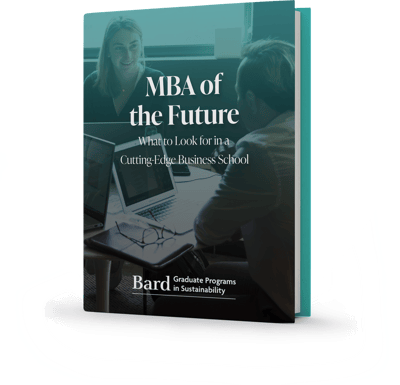MBA in Sustainability
+ Page Menu
Ranked #1 MBA For Impact in the World / #1 Green MBA / #1 Non-Profit Management
 Bard’s MBA in Sustainability is a globally leading business program that fully integrates a sustainability vision, real world consulting engagements, organizational transformation and entrepreneurial training, equipping graduates who are changing the game. Learn about our theory of change here.
Bard’s MBA in Sustainability is a globally leading business program that fully integrates a sustainability vision, real world consulting engagements, organizational transformation and entrepreneurial training, equipping graduates who are changing the game. Learn about our theory of change here.
What is an MBA in Sustainability?
Bard’s #1 ranked MBA in Sustainability:
- Prepares students for leadership roles across a variety of business environments, from innovative start-ups to major corporations.
- Provides in-depth training in core business skills through the lens of sustainability.
- Offers a curriculum grounded in management essentials while emphasizing the integrated bottom line: economic success, environmental integrity, and social equity.
- Positions future-focused students to be at the forefront of a major shift in business, as sustainability becomes central to corporate strategy and decision-making.
*International applicants: click here for important eligibility information.
Sustainability Baked In, Not Bolted On
This is more than just an MBA with a sustainability concentration. Bard fully integrates a focus on sustainability and mission-driven business into a core MBA. In courses from Operations to Strategy to Finance, students learn to use business tools to build businesses that are in business to solve social and environmental challenges. The program offers optional concentrations including Circular Value Chain Management and Impact Finance.
Engaged, Practitioner Faculty
Bard's sustainability MBA features small classes and close connections with world-class faculty. All of our professors are practitioners, inventing sustainable business in their day jobs and bringing that experience into the classroom.
Highly Experiential
The only MBA program that offers a year-long course in sustainability consulting for real-world clients. All students also complete an individually-mentored capstone project starting a company, driving change strategies in business as high-level consultants, or pursuing a career switch. These are just a few of the many reasons we're ranked among the best sustainability MBA programs.
Career Focused
At Bard, you'll never have to ask, "What can you do with an MBA in Sustainability?" Our master's in sustainability supports our graduates in finding jobs where they can make a difference at scale, soon, because time is short. In our Individual Career Planning process, each student meets with our career planning staff at least once every semester to develop and execute on their career plan. Students build their resumes through internships, consulting positions, certifications, case competitions, and the capstone process.
Learn more about our MBA career development program or review alumni career success here.
Hybrid Model: an In-Person and Online MBA in Sustainability
Bard's is a low-residency MBA, and our technology-enabled structure models the future of graduate business education. The program combines intensive face-to-face interaction, community building, and career networking through in-person weekend residencies with online evening classes.
We think of our sustainability MBA as a series of 3-4 day retreats, spread out over two or three years, and tied together by weekly online, live courses. Bard MBA's hybrid structure:
- Accommodates working professionals
- Allows students to manage family commitments
- Enables students to attend the program from across the U.S.
- Supports a world-class faculty of active practitioner-teachers
Full-Time and Part-Time MBA Enrollment Options
Bard offers full-time and part-time enrollment options, both in the hybrid structure, to accommodate students' schedules. Please review both enrollment options to identify the best fit or schedule a call with an admissions counselor to discuss your circumstances.

Full-time MBA — 2 Years
The full-time enrollment option allows Bard MBA students to complete their 60-credit MBA degree in the shortest time possible. This two-year option is best suited for students who are employed part-time or less. While all Bard MBA enrollment is hybrid (online + in person coursework), students are encouraged to recognize that the full-time option is a full master’s level course load of 15 credits per semester, requiring adequate time and headspace to complete the homework, classwork, and group projects.
- 2 year program with fall and spring semester enrollment
- 15 credits per term
- One 4-day Weekend Residency per month
- 6 hours of online classes per week (2 nights per week, 3 hours per night)
- 21 hours per week of online coursework and homework
- Recommended for students employed no more than 30 hours per week
Course Work
|
FIRST YEAR |
SECOND YEAR |
|
Note: Yearly course offerings are subject to change. |
Dropdown to Course Descriptions
Is a full-time MBA program right for me?
The Bard MBA full-time enrollment option is ideal for students who:
-
are working less than 30 hours a week
-
have minimal outside-of-school commitments
-
have a finite timeline in which they would like to earn their MBA
-
have a strong aptitude for time management and multi-tasking (if also working full-time or managing outside commitments)
Students pursing the full-time enrollment option may want to consider:
-
where they live (commuting to NYC from outside the region can incentivize some students to enroll full-time to minimize commuting time and others to enroll part-time to manage commuting and school requirements)
-
if they have the bandwidth to participate in non-required activities while enrolled full time including networking events, case/pitch competitions, consulting projects with faculty, internships etc.
-
their ideal work-life-school balance
**Every Bard MBA student has different financial, professional, and personal circumstances and chooses an enrollment option that works best for them. Please contact the Admissions Office for enrollment advice and to be connected with a current student with whom you can speak about their experience.**
Full-time students attend Residencies over a four-day weekend once a month. A illustrative sample schedule is below.
| Fridays | |||||
| 9:00 am–12 noon NYCLab |
12 noon–1:30 pm Lunch & Community Meeting |
1:45-4:45 pm Sustainable Management |
5:00–6:00 pm Student Council |
6:30–8:00 pm Guest Speaker or Networking Event |
|
| Saturdays | |||||
| 9:00 am–12 noon NYCLab |
12 noon–1:00 pm Lunch & Advisor Meetings |
1:00-3:45 pm Accounting |
3:45–4:15 pm Study Hall |
4:15–7:15 pm Economics |
|
| Sundays | |||||
| 9:00 am–12 noon Accounting |
12 noon–1:00 pm Lunch & Advisor Meetings |
1:00-3:45 pm Economics |
3:45–4:15 pm Study Hall |
4:15–7:15 pm Leadership |
|
| Mondays | |||||
| 9:00 am–12 noon Sustainable Management |
12 noon–1:00 pm Lunch & Advisor Meetings |
1:00-4:00 pm Leadership |
|||

Part-time MBA — 3 Years
The part-time enrollment option enables Bard MBA students to complete their 60-credit MBA degree while meeting outside work, family, and/or travel requirements. This three-year option is best suited for students who are employed full time, who have family or other personal commitments, or who may be traveling from outside the New York area to complete their MBA degree. The part-time option takes three years to complete and includes one summer course.
- 3-year program with fall, spring, and 1 summer semester enrollment
- 9 credits per fall/spring term, 3 credits per summer term (1 summer)
- One 3-day Weekend Residency per month*
- 3 hours of nightly online classes per week (Tuesday and/or Thursday nights)
- 15 hours per week of online coursework and homework
- Recommended for students employed more than 30 hours per week, with outside home/family commitments, and/or those traveling from out-of-state
- Students should note that the summer course requires in-person attendance for two weekend residencies in New York City
*Weekend Residencies are 3 days for part-time students; however part-time students are required to attend all 4 days of their first Residency for Orientation.
Course Work
|
FIRST YEAR |
SECOND YEAR |
THIRD YEAR |
First Summer
|
|
Note: Yearly course offerings are subject to change. |
Dropdown to Course Descriptions
Is a part-time MBA program right for me?
The Bard MBA part-time enrollment option is ideal for students who:
- are working more than 30 hours a week
- have multiple outside-of-school commitments (family, volunteer, career, etc.)
- have a flexible timeline in which they would like to earn their MBA
- would like to take full advantage of the various opportunities for networking and career development that business school presents
Students pursing the part-time enrollment option may want to consider:
- where they live (commuting to NYC from outside the region can incentivize some students to enroll full-time to minimize commuting time and others to enroll part-time to manage additional commuting time)
- if they hope to participate in non-required program activities/opportunities while enrolled at Bard including networking events, case competitions, consulting projects with faculty, internships etc.
- their ideal work-life-school balance
**Every Bard MBA student has different financial, professional, and personal circumstances and chooses an enrollment option that works best for them. Please contact the Admissions Office for enrollment advice and to be connected with a current student with whom you can speak about their preference.**
Part-time students attend Residencies over a three-day weekend once a month. A illustrative sample schedule is below.
Note that weekends are kept to three days, but may switch between a Friday-Sunday and Saturday-Monday schedule each semester.
| Saturdays | ||||
| 9:00 am–12 noon Operations & Supply Chains |
12 noon–1:00 pm Lunch & Advisor Meetings |
1:00–4:00 pm Operations & Supply Chains |
4:00–5:00 pm Community Meeting |
5:00–8:00 pm Entrepreneurship |
| Sundays | ||||
| 8:30–9:00 am Community Circle |
9:00 am–12 noon Entrepreneurship |
12 noon–1:00 pm Lunch & Advisor Meetings |
1:00-4:00 pm Study Break |
4:00–5:00 pm Dinner, Management Council |
| Mondays | ||||
| 9:00 am–12 noon NYCLab |
12 noon–1:30 pm Lunch & Advisor Meetings |
1:30-4:30 pm NYCLab |
||
Download the
MBA of the Future
Consider the current state of sustainability efforts, the role of business in needed social change, and the importance of a new type of business education in our free, downloadable resource.
Courses and Focus Areas
The Top Sustainability MBA Program
Unlike other sustainability MBA programs, Bard:- Simultaneously builds core business competencies while teaching students to explore innovative ways of managing organizations.
- Emphasizes an integrated bottom-line strategy, balancing economic, social, and environmental considerations.
- Embeds principles of sustainable development throughout the curriculum, from classes to projects.
- Equips students to make the business case for sustainability and assess the full impact of business decisions, including economic, social, and environmental outcomes.
This comprehensive approach is reflected in Bard’s #1 Green MBA ranking, demonstrating the program’s leadership in sustainability and commitment to preparing students to drive meaningful change.
If you're not sure how to choose an MBA program, a quick tour of the curriculum can help.
MBA Specialization: Focus Areas
In addition to the specialization in sustainable business earned by all of our graduates, the Bard MBA offers five optional Focus Areas. Students who complete the requirements for a Focus Area will have it noted on their graduation transcript.

Impact Finance
Bard’s Focus on Impact Finance trains a new breed of investment professional to move dollars from negative investments that are undermining communities and the natural world into positive investments that are regenerating the future. The field of Impact Finance has evolved to include Sustainable and Responsible Investing; shareholder activism; environmental, social and governance risk evaluation; green capital budgeting decisions; “patient capital” impact investing, and much recent, evidence-based practice that finance for impact done right will generate market returns. At the same time, a new generation of investors has arisen, seeking positive social and environmental outcomes from their investments. Bard's Focus prepares students for careers leading the transformation of conventional finance into impact finance.
To earn the Focus Area, students must complete the following courses:
- Principles of Sustainable Management (3 Credits)
- Accounting and the Integrated Bottom Line (3 Credits)
- Finance for Sustainability (3 Credits)
- ImpactLab (3 Credits)
Students must also complete a nine-credit Capstone project that engages substantially with impact finance.

Circular Value Chain Management
Bard’s Focus on Circular Value Chain Management trains students for a role that they will create: the “Chief Circularity Officer” or CCO. For true circular economy business models to succeed, CCO’s or their equivalent will be needed to drive the far-reaching operational and cultural changes required. Bard's Focus supports students to execute on these circular economy business models by integrating successful supply chain management with a deep understanding of circular economy strategy.
To earn the Focus Area, students must complete the following courses:
- Principles of Sustainable Management (3 Credits)
- Operations and Supply Chains (3 Credits)
- Data and Decisions (3 Credits)
- Circular Value Chain Management (3 Credits)
Sustainability Consulting
Since it's inception, Bard's MBA has required all students to take our signature year-long sustainability consulting course, NYCLab. The reason? All Bard graduates will be "consultants"-- either internal or external as people who drive change within organizations. The consulting toolkit is critical for sustainable business leaders. That said, many of our graduates are pursuing explicit careers in sustainability consulting, and the Sustainability Consulting concentration supports them with advanced classes in data analysis and management, as well as the year-long capstone in which they hone the consulting skills gained through NYCLab.
The destinations for our graduates range from KPMG to BSR to ERM to Freeman Consulting. Some of our alums have even started their own consulting firms, including Just Capital Quotient, Art to Zero, and Population.
To earn the Focus Area, students must complete the following courses:
- Principles of Sustainable Management (3 credits)
- NYCLab I & II (6 credits)
- Data, Analytics and Decision Making (3 credits)
- Data II (3 credits)
Students must also complete a nine-credit Capstone project that engages substantially with sustainability consulting.

Non-Profit Management
The Bard MBA teaches students to manage for mission, and in that sense, is agnostic to organizational form: for-profit, non-profit, cooperative, worker owned. Our success was recently acknowledged with a ranking among the Top 10 MBA's for Non-Profit Management. This puts the under-twenty year old Bard MBA in the company with long-established programs at Stanford, Columbia, Harvard and Berkeley. How did we get there so fast? Alumni success is the answer. Many of our graduates have left Bard to pursue leadership roles in the non-profit sector, including: IMPACCT Brooklyn, National Young Farmer's Coalition, and the Environmental Defense Fund.
Recognizing this career interest among our students, the MBA has layered a dedicated elective in Non-Profit Management onto our core managing-for-mission curriculum.
To earn the Focus Area, students must complete the following courses:
- Principles of Sustainable Management (3 credits)
- Becoming a Sustainable Organization (3 credits)
- Data, Analytics and Decision Making (3 credits)
- Non-Profit Management (3 credits)
Students must also concentrate their capstone projects on building a portfolio for career success in the non-profit sector.

Entrepreneurship
The Bard MBA requires all students to imagine and develop two entrepreneurial team ventures and pitch their ideas in our annual competition, Disrupt to Sustain. The initial effort happens in the first semester, as part of the Principles of Sustainable Management and the Accounting class, and the second is in year two, through the Entrepreneurship course. Although most of our students will never start a business, the critical entrepreneurial mindset -- envisioning a venture through every phase from ideation, to prototyping, to market testing and sizing, to telling the story effectively -- is another foundational toolkit that our change agents must master.
To earn the Focus Area, students must complete the following courses:
- Principles of Sustainable Management (3 credits)
- NYCLab I & II (6 credits)
- Data, Analytics and Decision Making (3 credits)
- Stakeholders and Marketing (3 credits)
With a strong coursework foundation, the Focus Area in Entrepreneurship is awarded to students who utilize their capstone to actually develop a new venture.
Sustainable Business Owner, Beatrice Ajajero, MBA ‘17
With my background in human rights and law, I joined the Bard MBA program to expand my toolkit. The program continues Bard's tradition of egalitarian engagement with world issues while providing a concrete focus in sustainability management. This preparation deepens my understanding of local, regional, and global dynamics around sustainability and gives me ready and applicable skill sets for problem solving in the 21st century. — Beatrice Ajaero, MBA ’17
Read about Beatrice's work: NY Times | Thrillist | ABC News |NYC Hospitality Alliance
NYCLab
In Bard’s experiential NYCLab course, MBA students complete a yearlong professional consultancy. Over two semesters, MBA students work with corporate, governmental, and nonprofit organizations to solve sustainability-related business problems. Student teams are assigned clients based on the team members’ interests and skillsets and are mentored by Laura Gitman, Chief Operating Officer at BSR, a leading global organization that develops sustainable business strategies and solutions through consulting, research and cross-sector collaboration. Learn more about the key role experience plays in preparing for a career in sustainability.
View Past Clients and Learn How to Become a Client
What can you do with an MBA in Sustainability?
Individualized Career Support
Students attend the Bard MBA to transition to meaningful work in sustainable business, helping lead the change towards social and environmental justice. Our program is uniquely focused on supporting graduates to build powerful careers in this new world of mission-driven companies. Bard's process is based in Individual Career Planning, in which every student meets every semester, one-on-one, with our career counselors to map out their transition strategy.
While in the program, students have the opportunity to build their professional network and resume through:
- Lead the Change Podcast where students interview global sustainability leaders
- Our Sustainable Business Series where students moderate a public sustainability careers panel
- Guest lecturers
- NYCLab consulting class,
- Internships and Consultancies
- Case Competitions.
Students are also assigned professional mentors each year they're in the MBA career development program and take advantage of monthly career-development workshops.
Finally, in Bard's unique, individually mentored MBA capstone, students work one-on-one with a faculty advisor to develop future careers as purpose-driven entrepreneurs, intrapreneurs or sustainability consultants. Bard MBA graduates join more than 400 alumni/ae working in the sustainable business and environmental policy field. View our Alumni Profiles Book below to explore career opportunities.
Bard MBA Careers
Many of our graduates are bringing their MBA skills to their existing positions. Others transition to new work. Recent career changes by Bard MBA students and graduates include moves to:
- Management Consulting at BSR, SustainAbility, KPMG
- Sustainability Director at Etsy
- Design Manager at EILEEN FISHER
- Executive Director at IMPACCT Brooklyn
- Asia Regional Coordinator at Waterkeeper
- Director, Global Sustainable Agriculture at PepsiCo
- Sustainability Coordinator at American Express
- Sustainability Director at Pratt & Whitney
- Sales at Tesla Motors
- Sustainability Manager at Eversource Energy
- VP of Operational Excellence at ING Financial
- CEO for startups in sustainable fashion, restaurants, green tourism, affordable housing
Frequently Asked Questions about an MBA in Sustainability
What is an MBA in Sustainability and is an MBA in Sustainability worth it?
An MBA in Sustainability is a graduate business degree that combines traditional management training with sustainability principles, including environmental stewardship, social responsibility, and ethical leadership.
Bard’s program equips students with skills to drive sustainable business practices and measure social and environmental impact. It is worth pursuing for professionals who understand that sustainability is at the forefront of consumer decision-making and the future of business specialization, and who are seeking leadership roles in sustainability-focused organizations, consulting, corporate responsibility, or entrepreneurship, providing both practical skills and a strong professional network.
What makes Bard’s MBA in Sustainability unique compared to other programs?
Bard's MBA in Sustainability fully integrates sustainability into our core curriculum, unlike traditional MBA programs that tack it on after the fact. The program emphasizes an “integrated bottom line,” focusing on economic success, environmental integrity, and social equity. Students can also choose specialized focus areas such as Impact Finance, Circular Value Chain Management, and Sustainability Consulting, preparing them to lead in mission-driven businesses and organizations.
What careers in sustainability do Bard MBA graduates pursue?
Graduates of Bard's MBA in Sustainability pursue leadership roles in consulting, corporate sustainability, nonprofit management, and entrepreneurship. Alumni have secured positions at firms like KPMG, Etsy, Calvin Klein, Revlon, and McDonald’s, and some have launched their own sustainability-focused ventures. The program equips students with practical skills and professional networks that translate into meaningful career outcomes.
How does Bard's MBA in Sustainability accommodate working professionals?
Bard’s MBA in Sustainability is offered in a hybrid format, combining online evening classes with one extended weekend residency per month in New York City. This structure enables working professionals to advance their education and career simultaneously without interrupting employment, making the program accessible to a wide range of students.
Want to learn more?
Let's chat!
We love to chat one-on-one with aspiring change agents. Our team is happy to schedule a call to discuss your sustainability career goals and tell you more about our various programs. We can also get you connected with an alum, professor, or student doing work you are interested in learning more about.

